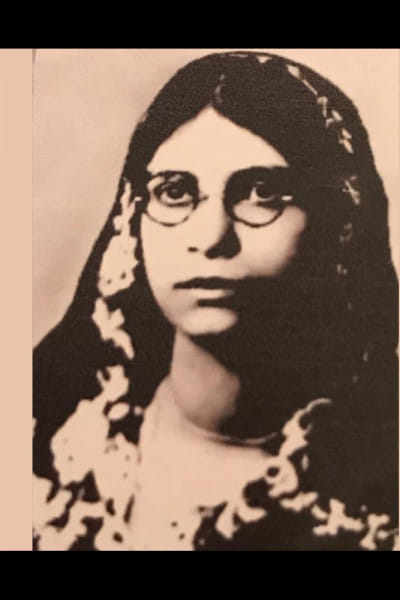Sufia’s Flight

Through her veil, staring out the plane window, Sufia N Hossain, formally known as Sufia Khatun, must have felt a whirlwind of emotions when her eyes met the vignettes of Calcutta: the Victoria Monument reigning over the flat landscape, the shadow of the Government House stretching itself over the roads, and in the distance the sprawling Jorasanko Thakur Bari. The petite 17-year-old poet was the first Muslim woman to fly on an airplane.
But this would not be the last time she would set a record. Sufia would later come to be known as Sufia Kamal, applauded by Tagore himself, and befriended by the mercurial Kazi Nazrul Islam. Even when she looked out of that plane window, she was already a published poet, a wife and a mother. She had already met the great minds of her generation, Gandhi and Rokeya Shakhawat Hosain, the feminist and poet, and Kamini Roy herself had encouraged Sufia to keep writing when she was only 12.
The poet lived up to the nickname Tagore had gifted her; she was the polar star for Bangladesh, an invaluable moral compass, the silver lining a country struggling to be born needed and longed for.
As far as her eye could see, she saw new changes and struggles for freedom.
Perhaps Sufia was thinking about the new wave of feminism making its way through Bengal, which was quickly pulling her in. Maybe her eyes, and her mind, fixated on the Bethune College campus, the first higher education facility for women in all of Asia, or the Sakhawat Memorial School, the very first school for Muslim girls, which was at this particular time, also 17 years old like Sufia herself. A whole generation of graduates had passed through, girls just like her, seeking knowledge and independence. Except she never had the chance to sit in a classroom; she had been barred from education by customs and purdah. Everything she knew was stolen.
All over Bengal, women were forming committees and societies to influence policy and advocate for women's rights. Just two years before that flight, the women of Bengal voted for the first time. Journals were brimming with stories by women, accounts of the absurdity and hypocrisy of gender discrimination, arguments for emancipation, and demands for recognition. Women were writing their place into society, fighting stereotypes such as "the so-called feminine virtues [which] have made women only women and not human" (Jaysree, 1931).
Tensions were escalating, and Sufia and her husband were in the very centre of it all—both of them writers—searching to define progress, freedom and empowerment. They were in the thick of the smoky intellectual circles gripped by the philosophies of Lenin and Gandhi. And then suddenly, Syed Nehal Hossain's health plummeted, and Sufia overnight became a widow and a single mother, supported only by her freelance writing jobs. But as full of grief and uncertainty she was, she could not return to her familial home in Barishal. Sufia had seen the city from the sky, and she was not ready to come crashing down into the role of a widow.
She was no longer the girl she had been, she had removed the veil, she was active, she talked to men as equals. With the help of her mother (her constant source of support after her father walked out to pursue a spiritual calling when she was born) and her peers, she remained in the city and persisted through myriad hardships, one day after another. She overcame inflation, riots, flu infections, and judgmental landlords.
And somewhere amidst all this, Sufia found the fuel for the years of fiery activism that lay ahead of her.
In 1938, Sufia Kamal remarried, finding a kindred spirit in writer Kamaluddin Khan. The year after World War II broke out and the years that followed passed in a blur of motherhood, protests, shock and heartbreak of famine and the fear of bombings. When the family finally moved to Dacca after the Hindu-Muslim clashes in 1947, Sufia was already well-versed in protests for social justice.
Other Muslim intellectuals also moved to Dacca, including the editor and writer Mohammad Nasiruddin Ahmed, a close friend of Sufia and her husband's. He was the one who had brought her first headshot to the renowned studio of Charu Guha in Calcutta after she took off the veil. Then too, she was the first Muslim woman to be photographed in the studio.
In Dacca, there wasn't even a year that went by where Sufia Kamal wasn't starting an organisation, leading a movement or presiding over a committee. From the age of 36 until her death at 88, Sufia Kamal worked through pregnancy, war, and curfews. She feared no one, and bowed to no one. When in 1971, a rumour broke out that she had been killed during the crackdown of March 25, there was so much international pushback that the Pakistani government was forced to broadcast an interview with the poet to prove that she was alive.
After independence, Sufia Kamal continued her work. The house had no gate and was always full of guests. The poet lived up to the nickname Tagore had gifted her; she was the polar star for Bangladesh, an invaluable moral compass, the silver lining a country struggling to be born needed and longed for.
Sufia Kamal lived by the truth of her words. She once said to Nasiruddin, "I'll go on doing my work silently, calmly. I'll remove the thorns along the path—so that, for those who come after, thorns don't prick their feet; so that for their thorn-pricked feet, they don't fall behind. That much I'll do with whatever strength I have."
And maybe that is what teenage Sufia was thinking, looking out of the airplane window, through her veil, through the clouds, at the City of Joy. She envisioned there would be others to follow after her, and so, she took it upon herself to lay the way for them.
Katerina Don is the curator of HerStory Foundation and writer for the taramonbd.com blog.
Follow The Daily Star Opinion on Facebook for the latest opinions, commentaries and analyses by experts and professionals.
To contribute your article or letter to The Daily Star Opinion, see our guidelines for submission.

 For all latest news, follow The Daily Star's Google News channel.
For all latest news, follow The Daily Star's Google News channel. 



Comments